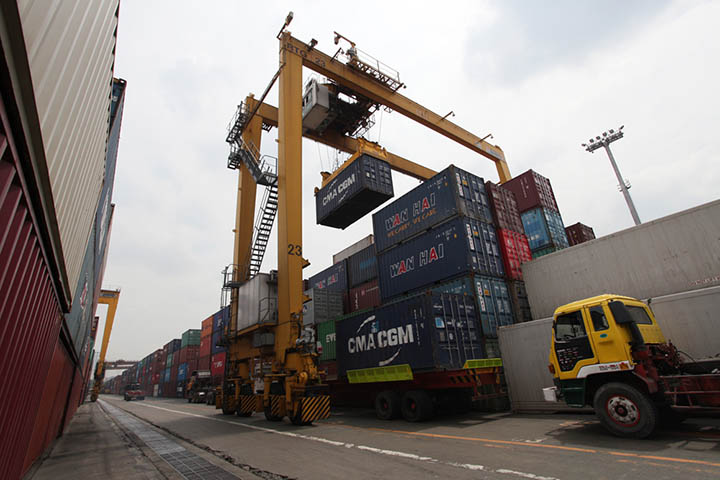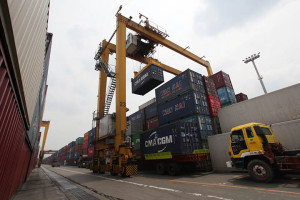

Manila South Harbor operator Asian Terminals Inc. (ATI) said it will not make changes to the Terminal Appointment Booking System (TABS) to, among others, allow automatic booking of containers with paid duties and charges.
ATI executive vice president Andrew Hoad, in a letter to Department of Labor and Employment undersecretary Rebecca Chato dated December 14, said the claims of Aduana Business Club, Inc (ABCI) that it was difficult securing a TABS booking and that slots were being given randomly are “without merit.”
He said TABS–an online platform that enables port stakeholders to select the time slots for delivering and withdrawing cargoes—has increased transaction efficiency at the Manila South Harbor, with the port handling more containers per day in early November and the first week of December. TABS came into operation on October 1.
Hoad said ATI went through an “investigation exercise” with ABCI president Mary Zapata on November 27 at the ATI premises “where all 15 ABCI containers in the terminal waiting for dispatch were examined. Every box was able to obtain an available slot within the 24-hour period.”
ATI, ABCI, the Bureau of Customs (BOC), and DOLE signed a memorandum of understanding on November 7 where they agreed ATI will “confer with its system developer (1-Stop) and ICTSI (International Container Terminal Services, Inc.) on opportunities to modify its TABS on or before 9 November 2015 to allow automatic booking upon registration with the OLRS (Online Release System) and payment of arrastre, wharfage, storage and shipping line charges.”
Hoad explained that “the request to modify the system to randomly award the next available slots to truck pick-ups, as opposed to planned pick-ups by brokers, is a fundamental change in philosophy and practice that blocks the intent of the system as directed by the Government to prevent a repeat of 2014 congestion.”
He said making such a change “is incompatible with the continuation of a modern vehicle booking system,” adding he was surprised “this was not immediately apparent to attendees at the meeting of November 7.”
In consultation with co-TABS implementer ICTSI, operator of the Manila International Container Port, and Chamber of Customs Brokers, Inc., Hoad noted “there is very little support for this change.” He said the country’s major exporters have praised the “system’s current efficiency for both their imports and exports.”
Hoad said this is supported by increased efficiency of 14% more transactions handled per day in early November and 48% more transactions a day by the first week of December.
Self-interest
Hoad accused ABCI of “pushing self-interest here under the guise of a public interest.” He claimed ABCI is “selling access to TABS to unregistered brokers and they want to sell trucking services also, for which the current organized system of bookings in advance gets in the way.”
The port executive revealed ATI has details of the allegation, “thanks to an Aduana employee who posted details in social media.”
Hoad said he “believes facilitating transactions by unregistered brokers breaks the law or certainly is against the government’s declared policy of squeezing unregistered brokers out of the system.
“ATI is not prepared to change a system to facilitate the action of an individual company in this way.”
He added, “When one puts this all together, at the end of the day one has to ask a fundamental question. Does the Philippines want a modern decongested port system like Singapore and Hong Kong or does it not? If it does, then it has to request that the minority of brokers who resist the system evolve and change together with the modernization of the system rather than allowing minority interests to hijack that process.
“If the country wants to go back to the 2014 truck ban environment with all that entails for negative economic growth, then that’s the choice the politicians can make, TABS can be stopped and the freight industry can be made to go back to the old ways of individuals in the supply chain seeking to profit from chaos. At the end of the day, the terminals are there to serve national economic interests in a way that is compatible with global best practice.”
In a later statement sent to PortCalls, ATI said its lines of communication are always open and that they regularly reach out to all stakeholders.
The South Harbor operator added that “some other issues, however, relating to shipping lines or Customs are beyond us and should be addressed to the appropriate parties.”
Protest action
Hoad’s letter is dated two days before the Customs Brokers Council of the Philippines, Professional Customs Brokers Association of the Philippines, Inc. (PCBAPI), and ABCI began their protest action on Dec 16–supposedly to last until Dec 18–against ATI’s implementation of TABS, encouraging members to stop deliveries and processing of entries.
The groups claimed TABS impedes the free flow of trade and translates to additional charges (demurrage, storage and detention). They said it takes two days to secure a TABS booking and up to five hours before a truck can enter the container yard, four hours before the container is loaded, and three hours before the truck is able to leave the terminal. This has led to trade delays, with one transaction requiring five days to deliver, it added.
CBCP-PCBAPI claimed TABS only benefits port operators and shipping lines.
On Dec 16 a handful of protesters held up placards and stayed for a few hours in front of the BOC office in Gate 3, Port Area.
One BOC-accredited value-added service provider said there was a 10% decline in lodgements for Manila South Harbor on Dec 16 compared with November 25, December 2, and December 9.
However, the VASP cannot say whether the decline can be directly attributed to the protest action. – Roumina Pablo




